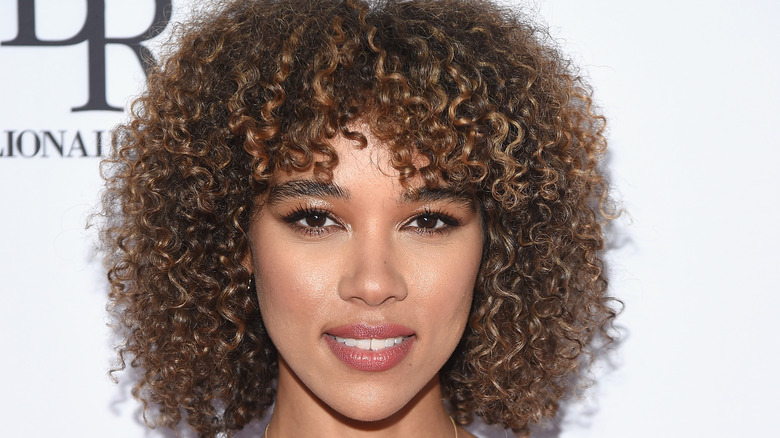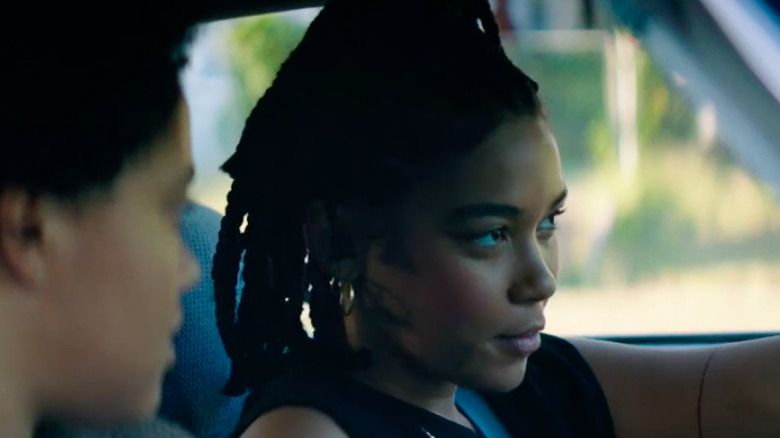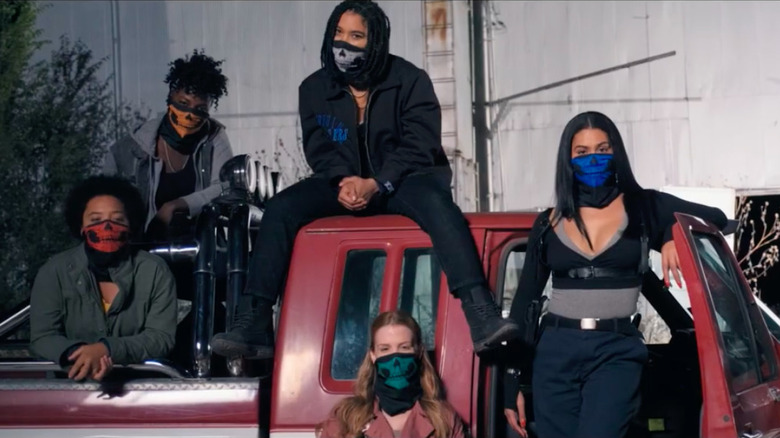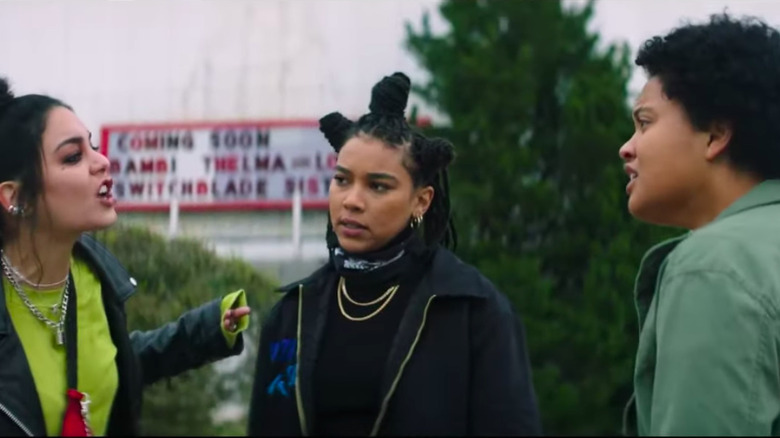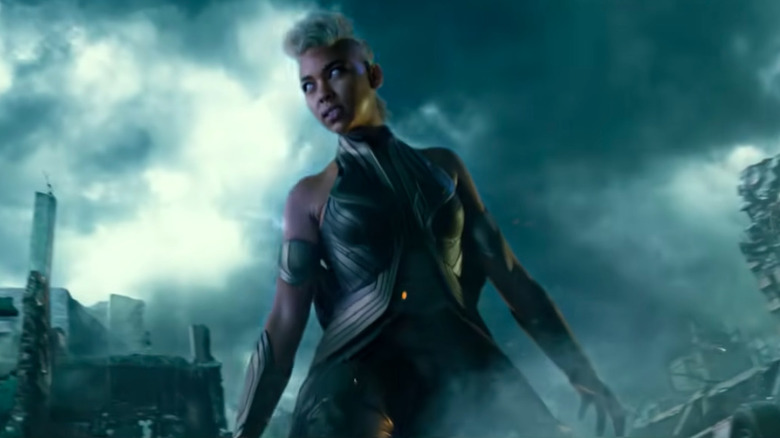X-Men's Alexandra Shipp On Empowerment In Asking For It And Reprising Storm In The MCU - Exclusive Interview
This interview contains references to sexual assault.
The movie "Asking For It" starts with an upsettingly familiar scenario: Joey (Kiersey Clemons), a waitress in a small town, is drugged and sexually assaulted by someone she thought she could trust. In the aftermath, one of Joey's customers, Regina (Alexandra Shipp), takes a reeling Joey under her wing, introducing her to her femme gang and offering her the opportunity to take action by joining them on a mission to take down the toxic Men's First Movement, a group that champions the dominance of men over women.
It's a timely tale that explores many potent topics, including the perpetration of violence against women, how women can empower one another, and the ways women of color face discrimination. It's all wrapped up in a sleek package that will keep viewers entertained even as it makes them think. Alexandra Shipp plays Regina as someone who's committed to her principles and willing to fight for what she believes in, but at the same time is the kind of strong, supportive friend everyone would like to have. It's another compelling performance by the actress who previously starred in the Lin-Manuel Miranda-directed "tik, tik...BOOM!," the coming-out story "Love, Simon," and as a young Storm in "X-Men: Apocalypse" and "X-Men: Dark Phoenix."
In an interview, Shipp spoke exclusively with Looper about why she wanted to be a part of "Asking For It," what she hopes viewers will take away from the film, and her feeling about following in Halle Berry's footsteps by playing Storm in the "X-Men" franchise.
If you or anyone you know has been a victim of sexual assault, help is available. Visit the Rape, Abuse & Incest National Network website or contact RAINN's National Helpline at 1-800-656-HOPE (4673).
Why she decided to appear in Asking For It
"Asking For It" broaches so many important topics. Why did you feel it was valuable to be part of it?
One of the first things that drew me to this role was exactly that. Very rarely do we see films that have this conversation. It was exciting to me to be able to be a part of something that's not only socially commentative but also says something. I love working with [writer and director] Eamon [O'Rourke] because I really think that he understood the assignment. Being able to work alongside two of my really good friends, Vanessa [Hudgens] and Kiersey [Clemons], and talking about stuff like this, which is conversations that we have all the time, really inspired me and made me go, "Okay, hey, this is something that I want to do."
That's interesting because one of the things I was wondering was, since the movie's written and directed by a white man, did you have any hesitation about signing on?
We actually spoke about that before any of us signed on, really. We said, "Is this the right person to be telling this story?" What we look at when we have these types of things is someone who can use their privilege in order to get a point across. We have to rely on our white [male] allies to help create these stories and to help tell them. That, in turn, meant a lot of hard conversations that Eamon was more than willing to have with us.
Taking the movie's message into the real world
There's something inherently empowering about the idea of women rising up against bad men, but there's a fantasy element to the film, with its idea of vigilantism. What do you hope about the movie's women's empowerment message will translate into the real world?
What I'm hoping is that by having this film, we shine a light on something that is usually swept under the rug. Sex trafficking, the women being assaulted at colleges, we talk about these things and nothing happens. What I love about art, television and film in particular since it's my side of the coin, is that we can tell these stories and not make it feel like we're preaching. People can see these things, they can see these situations, and they're able to make the decision for themselves. We can affect social change through representation. I really do believe that TV and film have the opportunity to do that. I've felt that on many occasions, whether it was with "Love, Simon" or "tick, tick...BOOM!," and really asking the questions and allowing your audience to create the answers.
Including a few good men in the movie
Even though the women at the center of the movie are rising up against bad men, the film doesn't hate all men and doesn't say that all men are bad. Why did you feel that was important for the film to touch on?
Because it's honest. We can't just turn all men into villains because they're not. I come from a family of boys and I know that there are good men out there. Ignorance is easy. Men don't experience the same things that we experience but they can empathize. When there are good men out there who are trying to change the narrative, like my brothers, like Eamon, then we can really do something.
We live in the world of a patriarchy, that's our society. If we can get some of these dudes on our side, or if they're inherently on our side because they were either raised by good women or have seen enough strife to want to be a part of the solution, then we can really do something about it. When I was talking to Eamon about his cis-hetero whiteness, he was like, "I want to change the narrative. I want to do what I can to be a part of change." That's what really inspired me about it. I was like, "Yeah, man, we need more [like you]." It's the only way that we're going to get stuff done right now. We need allies. That's the only way we're going to get stuff done, so we can't villainize all men because not all men are bad.
Emulating Halle Berry and playing X-Men's Storm in the MCU
You very famously played Storm in the last two "X-Men" films. What was it like taking over a role originated by Halle Berry, and would you ever be interested in reprising it in the Marvel Cinematic Universe?
It was really exciting to play a role that Halle Berry played only because she is my acting idol. When I think about when I first moved to Los Angeles to be an actor, my mom told me to find someone that I admired and try and do what they did. I definitely did that with Halle, and I did soap operas and modeling and things like that. To be able to play Storm was really huge for me. It felt like the universe was telling me that I was on the right path.
As for doing it again in the future, I would love to see a woman of darker complexion play Storm, personally. It's time that the studios give the audience what they want.
Asking For It is now playing in select theaters and available for rental and purchase on digital and video on demand.
This article has been edited for clarity.
